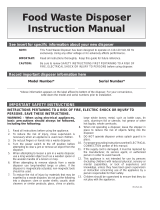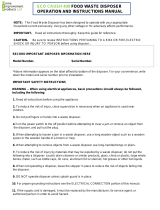
5
FOR WASTE DISPOSERS EQUIPPED WITH A
GROUNDED PLUG-IN POWER CORD.
A. PLUG INTO APPROPRIATE OUTLET
This appliance must be grounded. In the event of a
malfunction or breakdown, grounding provides a path of
least resistance for electric current to reduce the risk of
electric shock. This appliance is equipped with a cord
having an equipment-grounding conductor and a grounding
plug. The plug must be plugged into an appropriate outlet
that is properly installed and grounded in accordance with
all local codes and ordinances. If the supply cord is
damaged it must be replaced by the manufacturer, its
service agent or similarly qualified person in order to avoid
a hazard.
-OR-
B. CONVERT TO PERMANENT WIRE INSTALLATION
1. Remove Cord and Plug from the disposer – Simply
cutting the plug off of the existing cord is not allowed and
voids the warranty.
2. Follow instructions below for Permanent Wire Installation
instructions.
FOR WASTE DISPOSERS NOT EQUIPPED WITH
A GROUNDED PLUG-IN POWER CORD.
GROUNDING: This disposer must be connected to a
grounded, metal, permanent wiring system; or an
equipment-grounding conductor must be run with the
circuit conductors and connected to the equipment-
grounding terminal or lead on the disposer.
An acceptable motor control switch with a marked off
position shall be provided at the time of installation to
disconnect the disposer from all ungrounded supply
conductors. The switch shall be mounted in sight of the
disposer or in sight of the sink opening for the disposer.
WARNING: Electric Shock
Turn off power before installing or servicing disposer. All
wiring must comply with local electrical codes.• Do not
connect electrical current at main breaker panel until
adequate ground is established. Inadequate connection of
the ground wire can result in a risk of electric shock.
Consult with a certified electrician or tradesman if there is
any doubt whether the disposer in inadequately
grounded. Your disposer must be adequately grounded.
1. Turn off or disconnect all power to the wall junction
box serving the disposer.
2. Open the junction box in the wall and remove the wire
nuts or electrical tape or whatever is tying the old
disposer wire to the electrical wire inside of the
junction box.
3. Open the end bell plate at the bottom or the disposer.
If you are using flexible armored (BX) cable:
1. Install cable fitting in the disposer end bell hole.
2. Secure the cable to the fitting and install an insulating
bushing or equivalent.
3. Connect white wire from the junction box to the white
(or blue) wire of the disposer.
4. Connect black wire from the junction box to the black
(or brown) wire of the disposer.
5. Connect bare ground wire from the junction box to
green ground screw within the disposer end bell.
If you are using nonmetallic-sheathed (ROMEX) cable:
1. Install cable fitting in the end bell hole and secure the
cable to the fitting.
2. Connect white wire from the junction box to the white
(or blue) wire of the disposer.
3. Connect black wire from the junction box to the black
(or brown) wire of the disposer.
4. Connect bare ground wire from the junction box to
green ground screw within the disposer end bell.
If your power supply cable does not include a grounding
wire, one must be provided. Attach a copper wire securely
to the disposer ground screw and attach other end of
ground wire to a metal cold water pipe. Do not attach
ground wire to a gas supply pipe. Use only UL Listed
grounding clamp. If plastic pipe is used in your home, a
qualified electrician should install a proper ground.
GROUNDING INSTRUCTIONS
PERMANENT WIRE INSTALLATION INSTRUCTIONS
A. Connect disposer to appropriate household current
only.
4. ELECTRICAL CONNECTIONS
WARNING: IMPROPER CONNECTION OF THE EQUIPMENT-GROUNDING CONDUCTOR CAN RESULT IN A
RISK OF ELECTRIC SHOCK. CHECK WITH A QUALIFIED ELECTRICIAN OR SERVICEMAN IF YOU ARE IN DOUBT
AS TO WHETHER THE APPLIANCE IS PROPERLY GROUNDED. DO NOT MODIFY THE PLUG PROVIDED WITH THE
APPLIANCE IF IT WILL NOT FIT THE OUTLET. HAVE A PROPER OUTLET INSTALLED BY A QUALIFIED ELECTRICIAN.
The receptacle to which this appliance is
connected must be controlled by a switch.











